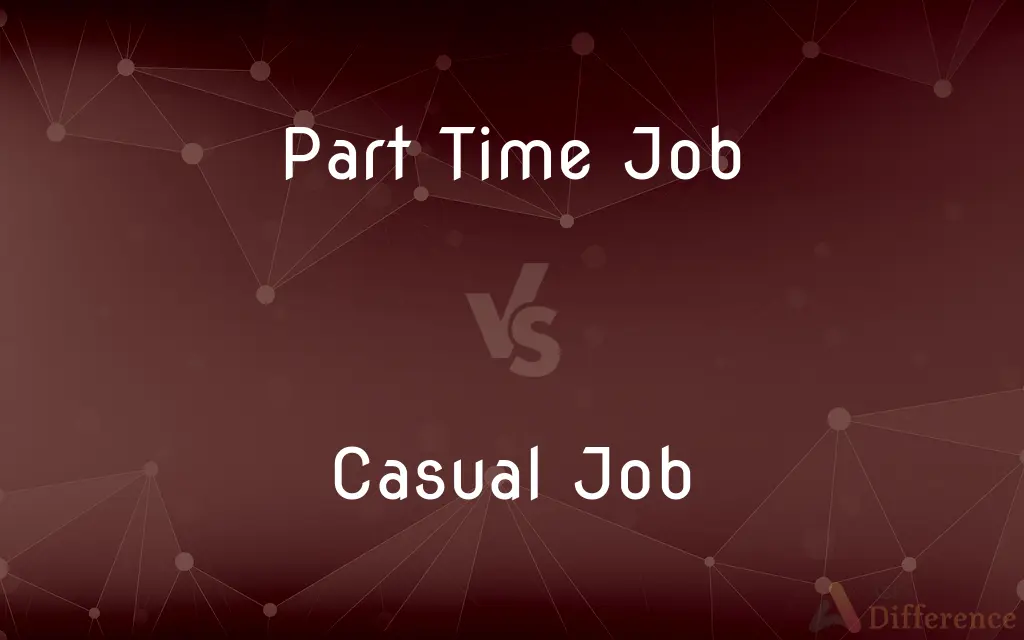Part Time Job vs. Casual Job — What's the Difference?
By Tayyaba Rehman & Fiza Rafique — Published on March 6, 2024
A part-time job offers regular, scheduled hours weekly, while a casual job provides variable hours with no guaranteed schedule, often with fluctuating pay based on hours worked.

Difference Between Part Time Job and Casual Job
Table of Contents
ADVERTISEMENT
Key Differences
Part-time jobs are characterized by a consistent schedule that typically involves working fewer hours than full-time employees. These positions often offer some level of job security and may include benefits, depending on the employer. In contrast, casual jobs offer flexibility and variability in hours, with workers usually not having fixed schedules. This means casual employees work only when needed, often receiving pay that includes a casual loading to compensate for the lack of benefits and job security.
Part-time employees usually have a predictable income, given their regular hours, making financial planning easier for them. Casual employees, however, may experience significant fluctuations in their earnings due to the inconsistent nature of their work hours. Part-time jobs are often found in industries that can predict their workload and thus can schedule employees on a regular basis. Casual jobs are more common in sectors with variable demand, such as retail, hospitality, and event management, requiring employers to adjust their workforce based on the current need.
Part-time workers may have access to some employment benefits such as annual leave and sick leave, accrued based on their hours worked, whereas casual workers typically do not receive these benefits. Instead, they receive a higher hourly rate as compensation for the lack of job security and benefits. This distinction highlights the trade-off between stability and flexibility when choosing between these types of employment.
The choice between part-time and casual work often depends on an individual's need for job security versus flexibility. Part-time work is suited for those seeking stable income and possibly some job benefits, while casual work is ideal for those prioritizing flexibility and the ability to accept or decline shifts based on personal preference or other commitments.
Comparison Chart
Schedule
Fixed, regular hours each week
Variable, no guaranteed hours
ADVERTISEMENT
Job Security
Higher, with predictable work schedules
Lower, dependent on demand
Pay Stability
More stable, with consistent earnings
Fluctuates based on hours worked
Benefits
May include pro-rated benefits (e.g., leave entitlements)
Typically none, but compensated with higher hourly rates
Industries Common In
Education, administration, healthcare
Retail, hospitality, event management
Compare with Definitions
Part Time Job
Suited for individuals needing predictable schedules for other commitments.
He chose a part-time job to balance work and college.
Casual Job
Employment with no guaranteed hours, offering flexibility and often a higher hourly rate.
He prefers a casual job to accommodate his unpredictable college schedule.
Part Time Job
A job requiring less than full-time hours, typically offering regular, scheduled work each week.
She found a part-time job that allows her to work mornings only.
Casual Job
Pay includes a casual loading to compensate for the lack of benefits.
His casual job pays 25% more per hour than similar part-time roles.
Part Time Job
Often requires a commitment to work a minimum number of hours weekly.
Her part-time contract specifies a minimum of 20 hours per week.
Casual Job
Ideal for workers seeking flexibility or additional income without a fixed schedule.
She works a casual job on weekends to earn extra money.
Part Time Job
Offers some job security and possibly benefits, with hours set in a contract.
His part-time job includes health insurance benefits.
Casual Job
Often found in industries with fluctuating workloads and seasonal peaks.
She found a casual job in retail for the holiday season.
Part Time Job
May serve as a stepping stone to full-time employment within the same company.
She started with a part-time job and was later offered a full-time position.
Casual Job
Lacks the benefits and job security of part-time or full-time positions.
Her casual job pays more per hour but offers no sick leave.
Common Curiosities
What is a part-time job?
A part-time job involves working fewer hours than a full-time position, with a regular, set schedule each week.
Are there industries where casual jobs are more common?
Yes, industries like retail, hospitality, and event management commonly offer casual jobs due to variable demand.
Do casual workers get paid more per hour than part-time workers?
Often, yes, casual workers receive a higher hourly rate to offset the lack of benefits and job security.
Why might someone choose a casual job over a part-time job?
For the flexibility to accept or decline shifts based on personal preferences or commitments, and potentially higher hourly pay.
Can you switch from a casual to a part-time position within the same company?
Yes, some companies allow employees to transition from casual to part-time positions, depending on availability and performance.
Can part-time workers receive benefits?
Yes, part-time workers may receive pro-rated benefits based on their hours worked, depending on the employer.
What defines a casual job?
A casual job offers no guaranteed hours or schedule, providing flexibility and often a higher hourly pay to compensate for the lack of benefits.
How are work hours determined for casual employees?
Hours for casual employees are determined based on the employer's needs and can vary greatly from week to week.
Is job security better in part-time or casual positions?
Part-time positions typically offer better job security with a regular schedule, unlike casual positions.
How does pay differ between part-time and casual jobs?
Part-time jobs offer stable pay based on regular hours worked, while casual jobs pay an hourly rate that may include a loading for the lack of benefits.
What is casual loading?
Casual loading is an additional percentage paid on top of the base hourly rate to compensate casual workers for not receiving benefits like sick leave or annual leave.
Is it easy to find casual work?
It depends on the industry and demand. Casual work can be easier to find in sectors with fluctuating needs or seasonal peaks.
What's the main advantage of part-time work over casual work?
The main advantage is the predictability of work hours and income, along with potential access to employment benefits.
Can part-time employees have multiple jobs?
Yes, part-time employees can work multiple jobs, as long as they can manage the schedules and meet their employers' expectations.
Do casual jobs offer any form of leave?
Typically, no. Casual jobs do not offer paid leave benefits, which is why they receive higher hourly rates.
Share Your Discovery

Previous Comparison
Orthodox Christianity vs. Orthodox Judaism
Next Comparison
Cream vs. Whipping CreamAuthor Spotlight
Written by
Tayyaba RehmanTayyaba Rehman is a distinguished writer, currently serving as a primary contributor to askdifference.com. As a researcher in semantics and etymology, Tayyaba's passion for the complexity of languages and their distinctions has found a perfect home on the platform. Tayyaba delves into the intricacies of language, distinguishing between commonly confused words and phrases, thereby providing clarity for readers worldwide.
Co-written by
Fiza RafiqueFiza Rafique is a skilled content writer at AskDifference.com, where she meticulously refines and enhances written pieces. Drawing from her vast editorial expertise, Fiza ensures clarity, accuracy, and precision in every article. Passionate about language, she continually seeks to elevate the quality of content for readers worldwide.
















































